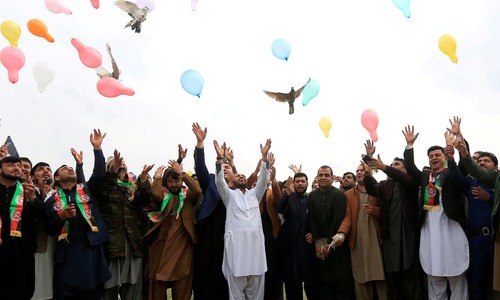As US troops prepare to leave Afghanistan, opening the door for a potential Taliban comeback, women across the country are nervous about losing their hard-won freedom in the pursuit of peace.
The militants were in power for around five years until the US invasion of 2001. They ruled Afghanistan with an iron fist that turned women into virtual prisoners.
The Taliban’s fall transformed women’s lives, much more so in urban areas like Kabul than in conservative rural Afghanistan.
But across the country, women remain wary of the militants, desperate to see an end to the violence, but fearful of paying a heavy price.
Here are some of their stories:
‘How will I support my family?’
Under the Taliban, women were barred from seeking education or work -- rights that Afghan female professionals are fiercely protective of today.
In the western city of Herat, saleswoman Setara Akrimi, 32, said: “I will be very happy if peace comes and the Taliban stop killing our people. “But if the Taliban come back to power... with their old mentality, it is a matter of concern for me,” the divorced mother of three added.
“If they tell me to sit at home, I will not be able to support my family,” she said.
“There are thousands of women like me in Afghanistan, we are all worried.”
Akrimi’s anxieties are echoed by Kabul-based veterinarian Tahera Rezai, who believes “the arrival of the Taliban will affect women’s right to work, freedom and independence”.
“There has been no change in their mentality,” the 30-year-old said.
Passionate about her career, Rezai said she was pessimistic about her prospects if the militants return to government, even in a truncated capacity.
“Looking at their history, I feel less hopeful... I believe the situation will get harder for working women like me,” she said.
In the run-up to the US deal, the militants made a vague commitment to respect women’s rights in line with “Islamic values”, prompting warnings from activists that the pledge was mere lip service and open to broad interpretation.
The Taliban control large swathes of Afghanistan and while they now allow girls to attend primary school in some areas, occasional reports of flogging and even the public stoning of women persist, fuelling fears they will turn back the clock if they return to power.
‘Every family is grieving’
Many ordinary Afghans are struggling to balance their desire for peace with their dread of the Taliban.
“Every family here is grieving because they have lost their children, sons, husbands, brothers in the war,” government official Torpekay Shinwari said in eastern Nangarhar province, which witnessed fierce battles between the Taliban and the militant Islamic State’s Afghanistan affiliate.
The 46-year-old said she was praying for peace, but was increasingly concerned that “women would be looked upon as the second sex and suppressed” if the militants gain ground.
‘The young generation has changed’
But in Kandahar, the birthplace of the Taliban, schoolgirl Parwana Hussaini struck a rare optimistic note.
“I am not worried. Who are the Taliban? They are our brothers,” the 17-year-old said.
“We are all Afghans and want peace.” Furthermore, she added: “The young generation has changed, and will not allow the Taliban to enforce their old ideology upon us.”
‘I don’t want this so-called peace’
For those who bore the brunt of the militants’ merciless rule, however, there is little doubt that a Taliban comeback will bring anything other than a repeat of “dark and painful memories”.
Factory worker Uzra, from the mainly Shia Hazara ethnic minority, sobbed as she recounted life as a young mother, alone at home with her children when the Taliban arrived in her village.
“I still vividly remember the day... They massacred all the men, and then came to my house,” the 40-year-old said, too frightened to give her full name.
Published in Dawn, March 2nd, 2020














































